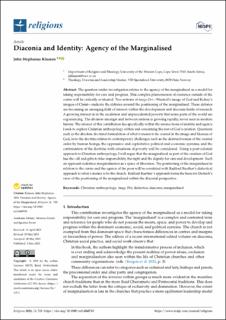| dc.contributor.author | Klaasen, John Stephanus | |
| dc.date.accessioned | 2023-11-01T14:14:00Z | |
| dc.date.available | 2023-11-01T14:14:00Z | |
| dc.date.created | 2023-08-30T09:25:22Z | |
| dc.date.issued | 2023 | |
| dc.identifier.citation | Religions. 2023, 14 (6), 1-11 | en_US |
| dc.identifier.issn | 2077-1444 | |
| dc.identifier.uri | https://hdl.handle.net/11250/3100047 | |
| dc.description | This article is an open access article distributed under the terms and conditions of the Creative Commons Attribution (CC BY) license (https:// creativecommons.org/licenses/by/ 4.0/). | en_US |
| dc.description.abstract | The question under investigation relates to the agency of the marginalised as a model for taking responsibility for care and progress. This complex phenomenon of existence outside of the centre will be critically evaluated. Two notions of imago Dei—Wentzel’s image of God and Kelsey’s images of Christ—indicate the debates around the positioning of the marginalised. These debates are becoming an emerging field of interest within the development and diaconia fields of research. A growing interest is in the escalation and unprecedented poverty that some parts of the world are experiencing. The division amongst and between nations is growing rapidly, never seen in modern history. The interest of this contribution lies specifically within the intersections of identity and agency. I seek to explore Christian anthropology within and concerning the rest of God’s creation. Questions such as the absolute doctrinal formulation of what it means to be created in the image and likeness of God, how the doctrine relates to contemporary challenges such as the destructiveness of the created order by human beings, the oppressive and exploitative political and economic systems; and the continuation of the doctrine with situations of poverty will be considered. Using a post-colonial approach to Christian anthropology, I will argue that the marginalised as part of the creation of God has the call and gifts to take responsibility, the right and the dignity for care and development. Such an approach redefines marginalisation as a space of liberation. The positioning of the marginalised in relation to the centre and the agency of the poor will be correlated with Radford Ruether’s dialectical approach to what it means to be the church. Radford Ruether’s approach forms the basis for Dietrich’s view of the positioning of the marginalized within the diaconal perspective. | en_US |
| dc.language.iso | eng | en_US |
| dc.publisher | MDPI | en_US |
| dc.rights | Navngivelse 4.0 Internasjonal | * |
| dc.rights.uri | http://creativecommons.org/licenses/by/4.0/deed.no | * |
| dc.subject | marginalised | en_US |
| dc.subject | diaconia | en_US |
| dc.subject | dialectics | en_US |
| dc.subject | imago Dei | en_US |
| dc.subject | christian anthropology | en_US |
| dc.title | Diaconia and identity: Agency of the marginalised | en_US |
| dc.type | Peer reviewed | en_US |
| dc.type | Journal article | en_US |
| dc.description.version | publishedVersion | en_US |
| dc.rights.holder | © 2023 by the author. Licensee MDPI, Basel, Switzerland | en_US |
| dc.source.pagenumber | 1-11 | en_US |
| dc.source.volume | 14 | en_US |
| dc.source.journal | Religions | en_US |
| dc.source.issue | 6 | en_US |
| dc.identifier.doi | 10.3390/rel14060745 | |
| dc.identifier.cristin | 2170734 | |
| cristin.ispublished | true | |
| cristin.fulltext | original | |
| cristin.qualitycode | 1 | |

